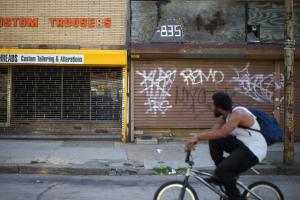What the Academy Awards Tell Us About the Value of Black Work
The Nation
 While some communities are currently enjoying the fruits of the recovery, others have sunk further into poverty. According to the authors, this pattern of distress vs. prosperity not only “diverges between cities and states but even more starkly within cities at the neighborhood level." In the period of recovery following the Great Recession, the authors find, jobs in the median U.S. ZIP code grew at less than half the national rate.
While some communities are currently enjoying the fruits of the recovery, others have sunk further into poverty. According to the authors, this pattern of distress vs. prosperity not only “diverges between cities and states but even more starkly within cities at the neighborhood level." In the period of recovery following the Great Recession, the authors find, jobs in the median U.S. ZIP code grew at less than half the national rate.
 Harper Lee's classic novel was one of hope, young hope. Her last, Go Set a Watchman, a sad acknowledgment of the incredible power of racial hate in my home state of Alabama, reveals that Atticus turns out to be a Kluxer! An example of how America, especially the American South, has yet to confront, admit, and rectify the original sin of legal racialism enshrined in our founding documents - three fifths of a person.
Harper Lee's classic novel was one of hope, young hope. Her last, Go Set a Watchman, a sad acknowledgment of the incredible power of racial hate in my home state of Alabama, reveals that Atticus turns out to be a Kluxer! An example of how America, especially the American South, has yet to confront, admit, and rectify the original sin of legal racialism enshrined in our founding documents - three fifths of a person.
 The idea that "everything and everybody everywhere should operate as if they were a business" has emerged a working definition of contemporary neoliberalism. Another way of putting it is that "everything and everybody everywhere" should actually be a business. Lester K. Spence shows how this philosophy pains most of us while focusing on neoliberalism's effects on black politics. Brandon Soderberg offers an introduction to Spence's argument.
The idea that "everything and everybody everywhere should operate as if they were a business" has emerged a working definition of contemporary neoliberalism. Another way of putting it is that "everything and everybody everywhere" should actually be a business. Lester K. Spence shows how this philosophy pains most of us while focusing on neoliberalism's effects on black politics. Brandon Soderberg offers an introduction to Spence's argument.
 In September 1965 a dozen or so members of Dr. Martin Luther King Jr.’s southern field staff moved into the West Side Christian Parish’s Project House in the heart of Chicago’s Near West Side, joining other volunteers already living there. Black and white, male and female, most of them still in their early twenties, they had already been tested by civil rights struggles in the South.
In September 1965 a dozen or so members of Dr. Martin Luther King Jr.’s southern field staff moved into the West Side Christian Parish’s Project House in the heart of Chicago’s Near West Side, joining other volunteers already living there. Black and white, male and female, most of them still in their early twenties, they had already been tested by civil rights struggles in the South.
Spread the word